Home » Jazz Articles » Live From New York » Wayne Shorter, Roscoe Mitchell & Oliver Lake
Wayne Shorter, Roscoe Mitchell & Oliver Lake
Wayne Shorter
saxophone1933 - 2023
Usually, within this quartet setting, Shorter might stick with a single horn (most often his tenor) for the best part of an hour, before turning to an alternative. But, for the opening stretch of this gig, he was regularly swapping between the two, playing a few phrases before alternating. Eventually, he seemed happy with the soprano, but the rapid changeovers remained in place. Later on,

Brian Blade
drumsb.1970
It's always magnetizing to observe Shorter's internal workings, revealed so plainly in his demeanor. He was openly hesitant, as he anticipated a suitable entry point, to join the patterns being constructed by Blade, pianist

Danilo Pérez
pianob.1966

John Patitucci
bassb.1959
Once Shorter settled down in his surroundings, it became easier for the audience to immerse itself. There seems to be something about this venue which courts inattention from its punters. The rows seemed too full of cameramen, loud talkers and folks fiddling with their illuminated devices. Because the band adopts a certain casual relaxedness, this might be taken the wrong way by the audience: as a sign that fidgeting is allowed. The quartet's music demands great concentration, their explorations loaded with atmosphere, space and tentative pauses. Because this is a society function, much like a night at the opera, folks felt the need to make themselves heard more than is usually needed, as if to make their personal communication with Shorter. Normally, I advocate verbal audience interjections, up to a reasonable point, to take jazz back to its raunchy whorehouse past. But this wasn't really the kind of music for that: this was music that demanded complete silence, for once.
For an artist who is now one of the greatest living creators of jazz, Shorter takes an astounding series of chances. He's never complacent. He's always searching for new ways to state his thoughts. Because of this experimental approach, the quartet opened itself up to occasional failure. The last time that I witnessed them, before this gig, was at the 2010 Jazz Middelheim festival in Belgium—the best set I've experienced from this lineup. The first time that I saw them play was near the beginning of their journey, in Birmingham, England. On that occasion, they were strangely meandering.
On this night, there were a few interludes of drifting, but then the players would sink their hooks into a new line of thought. The band appears to have become more aggressive in recent years, eager to shape hard riffs and winkle out repetitive cycles, latching onto an insistent melody. One moment was completely surprising, as Blade suddenly flipped, hammering out a monster hip-hop beat, sticks raised skywards with rampant purposefulness. Shorter responded straight away, delivering some of his funkiest playing in a long while, his soprano sounding like it was springing right out of a

Weather Report
band / ensemble / orchestraRoscoe Mitchell
Roulette
February 17, 2010
In a much smaller, more alternative venue, an equally august reed man celebrated his 70th birthday with a two-part performance. Even so,
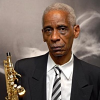
Roscoe Mitchell
saxophoneb.1940
Mitchell rarely performs in NYC. The last time, at The Kitchen, he was in a more cerebral, new music frame, so this was a rare chance to hear him in a more outwardly jazzy setting. Not that his quartet was set to make music that was anything like Mitchell's music with the

Art Ensemble Of Chicago
band / ensemble / orchestraThis evening seemed like the presager of spring, the climate suddenly much milder outside, after weeks of piled-high snow and harsh winds. Also, Roulette's air conditioning was turned off, due to the expected quiet stretches in the music. This space, packed densely with sweaty bodies, began to take on a sauna ambiance. Mitchell began with the faintest exhalations, blowing through his soprano saxophone with barely a note registering. Just the wind. Then, he was making tentative fingerings, issuing frail flutterings, stray phrases and trailing suggestions. Was that the return of the air conditioning? No. When Wessel started caressing his soundboard, he was dispersing his electro-acoustic matter around Roulette's multi-speaker system. His low rumbles were almost subliminal at first, confined to a single speaker. Then, as he gathered his forces, it became more apparent that this was Wessel, and not the distant movements of the building or the street outside.
Wessel plays Slabs, which is a somewhat home-made-looking pad, linked to the Max/MSP digital program. We're used to seeing most folks employing similar gear that's angled more towards percussion usage. Wessel's equipment might appear minimalist and primitive, but it's extra-sensitive, allowing heightened triggering sensitivity.
Mitchell continued his skeletal spiral-shaping, calculatedly thin against the deep resonance of the electronics. Wessel's material mostly sounded as though is was grown out of instruments that we already knew, but re-shaped and pulled into unfamiliar coverings. There were drum skin descendants, Thai or Laotian reed sounds and maybe even the real-time capturing of Mitchell himself, fingerings magnified monstrously. Paradoxically, Wessel's ostensible role as a foundation-building low-tone specialist came to be the dominant, most impressive element of this first set, with Mitchell almost acting as a decorative accompanist. It was the second set where the saxophonist really rose to prominence, leading a jazz quartet into the maelstrom of improvised catharsis.
The evening's musical contrasts were inspired. Mitchell's quartet was more old-school in orientation, with pianist
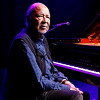
Dave Burrell
pianob.1940

Henry Grimes
bass, acoustic1935 - 2020
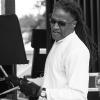
Tani Tabbal
drumsMitchell never edged into blurting, always choosing to maintain a warm, organic tone. The quartet took five or ten minutes to begin their journey in earnest, but following this initial exploratory drift, they entered into a long sequence of almost traditionally-alternating solos, as if they were playing within bebop rules, with free jazz sounds. The glowing audience reaction at the end was a response to the music, but it was also acknowledging the entire career and achievements of Mitchell, in his 70th year on the planet. Yes, it was Carnegie Hall applause, transposed to Manhattan's first home of experimental music, deep in the old loft scene's former heart.
The Oliver Lake Organ Quartet
Roulette
February 19, 2011
Of course, Roulette won't be in Manhattan for much longer. Unless plans go horribly awry, this will be the venue's last season before relocating to its new 1928-vintage Art Deco Concert Hall in Brooklyn. Just like the Issue Project Room, Roulette is making a bold move into larger, older, quainter premises.
Roulette has a unique character. It sometimes seems slightly skewed when a band that is fundamentally jazzy performs here. Alto saxophonist

Oliver Lake
saxophoneb.1942

Jared Gold
organ, Hammond B3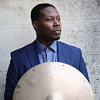
McClenty Hunter
drums
Freddie Hendrix
trumpetb.1976
Gold's foot-pedals look like they're homemade, exposed in their workings and added to a portable organ-synth model. Sonically, he certainly doesn't suffer for not humping around a genuine Hammond B3. Despite having one of his instrument's felt pads fly off into the ether, Lake managed to maintain his fluid, graceful momentum. Whilst he disappeared for a speedy repair session, the other three players capitalized on an opportunity to show off their own prowess. Even besides this, there were frequent spitting, incendiary solos from Hendrix, who was shooting molten sizzles with great rapidity and directional accuracy. I'm not sure whether Lake was deliberately using The Room of Rest's door as the biggest mute in the history of jazz, but he was playing along beside Hunter's drum solo, audible during his stick-thunder pauses. It's a concept that could be developed further, with band members being periodically banished to adjoining rooms. John Cage would have chuckled.
Tags
Live From New York
Martin Longley
United States
New York
New York City
Wayne Shorter
Brian Blade
Danilo Perez
John Patitucci
Weather Report
Roscoe Mitchell
David Wessel
Art Ensemble of Chicago
dave burrell
Henry Grimes
Tani Tabbal
Oliver Lake
Jared Gold
McClenty Hunter
Freddie Hendrix
Comments
PREVIOUS / NEXT
Support All About Jazz
 All About Jazz has been a pillar of jazz since 1995, championing it as an art form and, more importantly, supporting the musicians who make it. Our enduring commitment has made "AAJ" one of the most culturally important websites of its kind, read by hundreds of thousands of fans, musicians and industry figures every month.
All About Jazz has been a pillar of jazz since 1995, championing it as an art form and, more importantly, supporting the musicians who make it. Our enduring commitment has made "AAJ" one of the most culturally important websites of its kind, read by hundreds of thousands of fans, musicians and industry figures every month.
Go Ad Free!
To maintain our platform while developing new means to foster jazz discovery and connectivity, we need your help. You can become a sustaining member for as little as $20 and in return, we'll immediately hide those pesky ads plus provide access to future articles for a full year. This winning combination vastly improves your AAJ experience and allow us to vigorously build on the pioneering work we first started in 1995. So enjoy an ad-free AAJ experience and help us remain a positive beacon for jazz by making a donation today.

New York City
Concert Guide | Venue Guide | Local Businesses
| More...


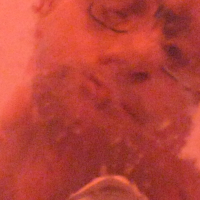

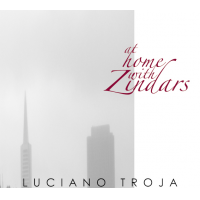




 Buy Now
Buy Now



















